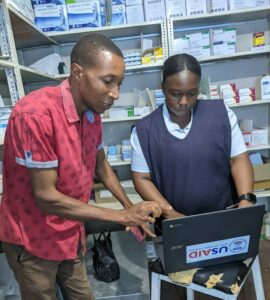Sustainability of an innovative change to the health system can be a challenge. All health care projects involve risks and challenges, however, the key to project success and sustainability is being able to anticipate, monitor, and manage the full range of risks and challenges throughout the project lifecycle and build capacity that can continue beyond the project. That is exactly what the USAID Electronic Supply Chain Management Information System (eSCMIS) project has been doing while implementing the Zambia Ministry of Health’s (MOH) Electronic Logistics Management Information System (eLMIS).
Funded by USAID and implemented by John Snow Health (JSH) Zambia, the eSCMIS project aims to improve Zambia’s health logistics system. The project has, to date, deployed the eLMIS system to over 950 health facilities and has been managing its maintenance, including replacement of equipment and software updates. At the end of the five-year project, which is now in its final year of implementation – the entire system will be handed over to the MOH. The government will take ownership of deployment, training, and funding technical supervisory support (TSS). TSS enables those entities (health facilities, pharmacies, etc) using the system to learn its use and troubleshoot challenges encountered.

Hermity Hangoma, Biomedical Scientist for Chikankata District, conducting TSS at Riverside Clinic
To ensure the smooth running of the system and its sustainability, the eSCMIS project embarked on a deliberate transition plan which involves skills transfer to MOH staff at all levels – facility, district, provincial, and national level. By training MOH staff and ensuring their involvement in all TSS visits over the last few years, the project increased workforce support and accelerated the deployment process.
TSS is a critical part of the deployment process as it not only ensures the smooth running of the system, but also provides an opportunity for capacity building of facility staff. During TSS, facility staff are taken through the process of identifying problems in their ordering process and addressing them. By doing so, the project prudently reduces transportation costs and saves time on travel to facilities for every problem.
In 2023 the MOH conducted its own fully funded TSS in Kalomo District led by the District Pharmacist, Alaiva Chibambo and supported by the District Health Director, Kalaluka Malungwe. The facilities that were visited include; Nameto, Sipatunyana, Mabuyu, Teranova, Nanduba, Nkandanzovu, Habubile, Chilala, Bulyambeba, Dimbwe, Choonga, and Mukwela rural health posts and Kasiye Gorge hospital.
As Chibambo put it, “the district team managed to resolve problems they found at the health facilities they visited by applying the skills they had learned through the various deliberate on-the-job training platforms the USAID eSCMIS project provided during joint deployments and TSS activities.”

Hermity Hangoma, Biomedical Scientist for Chikankata District
Facilities in the district faced various challenges with submitting data and reports using the eLMIS system, due to network issues and outdated computer systems, among other reasons. The MOH, through timely TSS visits, identified these issues and resolved them, allowing facilities to submit data.
“The eLMIS system has allowed us to get rid of the tedious paperwork. It has eased and hastened the reporting process and has enhanced the quality of reporting. We no longer have to make several phone calls to follow-up on reports as requests for commodities are now submitted at a click of a button and commodities are now delivered on time,” expressed Biomedical Scientist for Chikankata District, Hermity Hangoma.
Hermity recommends that the project continue with routine visits to ensure knowledge and skills transfer within the facilities.
